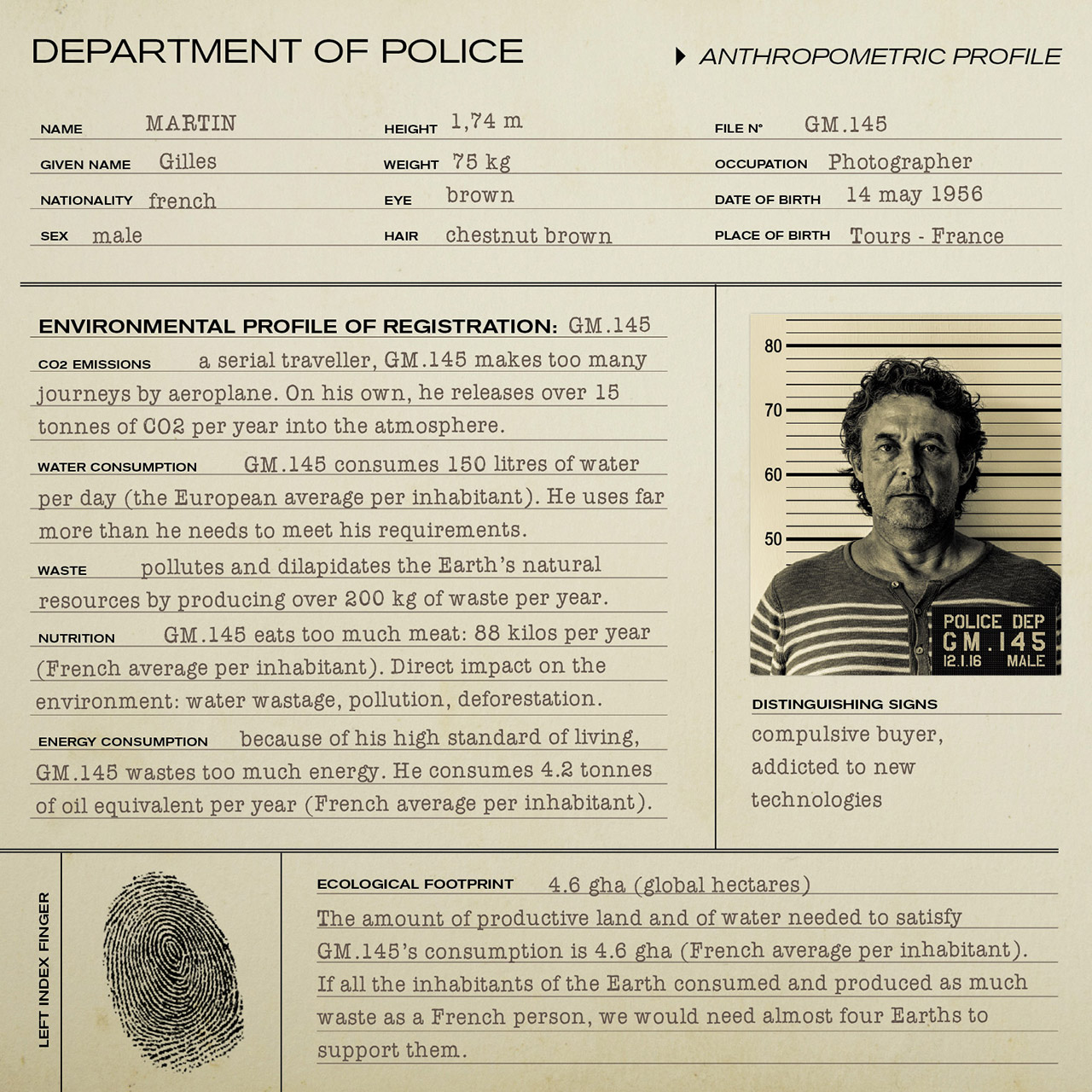
Registration GM.145


Trafficking sea turtles. See portfolio

Over-population around the world, the taboo of the century.

Farmer and his horse ploughing field.
Anti-Atlas, Morocco.

Small producer of biological coffee cooperative of UCIRI.
State of Oaxaca, Mexico.
Speak out
An open forum
without filters or taboos
GM.145 sentenced
In spite of action taken for the conservation of biodiversity and efforts to reduce its impact on the environment, GM.145 remains a human being with all its paradoxes. Its living conditions reveal contradictory behaviour and deep inconsistencies between its convictions and its acts.
GM.145 has been found guilty of excessive carbon emissions, and has been sentenced to 90 days of TIG (Transition d'Intérêt Général – Transition in the Public Interest). “90 jours” (90 days) is a personal assistant for ecological transition that works to make concrete changes to consumer habits. The app can be downloaded free of charge to a smartphone or computer.
All responsible, all guilty
Behind that off-beat police record full of self-mockery, a sad reality lies concealed: with few exceptions, Homo sapiens* is not ready to make any sacrifice to safeguard the Earth and the charges brought against humans are sufficiently damning to justify the species being charged with “failure to give assistance to a planet in danger”.
Charges:
- with no sense of guilt, humans squander and waste land and sea resources
- humans are self-centred, and think only of their immediate pleasure
- humans are quick to make a claim and to grow indignant, but remain passive when it is time to take action
- humans excel in the art of easing their consciences by rejoicing over the fact that they sort their waste
- humans are addicted to material goods
- humans are not prepared to make any concession that would risk compromising their personal comfort
- humans know the consequences and impact of their lifestyles on the environment and on biodiversity, but do not care
- humans do not measure the disastrous consequences of their exponential population growth.
Homo sapiens*: an invasive species that is very dangerous for itself and for all other living beings in the biosphere. Homo sapiens’ proliferation is a genuine danger for the future of the Earth.
Over-population: the taboo of the century
“This evening, I shall talk to you about the most serious danger that threatens our future: over-population around the world and in France.”
Over forty years ago, those were the words of René Dumont, founder of the “Ecological Movement”. At the time, the blue planet had a population of just four billion; today, that figure has almost doubled.
René Dumont was right to be alarmed by the worst scourge to rear its head during coming years: over-population. The subject is ultra-taboo, and one that most politicians, journalists, and high-profile pseudo-ecologists stay away from so they don’t offend religious and conservative lobbies who advocate high birth rates. By way of proof, the topic of world over-population was missing from COP21 discussions – even though it is one of the main causes of global warming!
Rolling up one’s sleeves
Ecology is discouraging because it is complex, cross-cutting, and often abstract, except when a heat wave kills, heavy rains drown, pollution poisons, and over-used soil refuses to feed.
Since we started looking at those inextricable problems – which was some forty years ago –, lines have moved imperceptibly. Scientists (or even “scientivists”), philosophers, whistleblowers, and enlightened, militant citizens mobilise their neurons and roll up their sleeves. A discourse emerges, certainly with divergences, but findings are generally unanimous and embryonic solutions emerge or even converge in all fields, all inter-related: food, energy, the economy, democracy, education, etc.
Changing the world
Some successes even give rise to hope: in 2015, the historic court victory of an NGO, Urgenda, and 900 co-plaintiffs against The Netherlands for failure by the latter to comply with its duty of vigilance in the face of “imminent danger caused by climate change”.
In another vein is the success of a cheery documentary, Demain (Tomorrow), which saw the light of day thanks to crowd funding; one month after it was first shown, the total number of cinema viewers who had seen it stood at 300 000. The pitch? Solutions to the ecological, economic, and social crisis (we have long known that they are all linked) gleaned from ten countries in “road movie” style.
Claiming the right to feel optimistic
The common ground between those two fruitful initiatives: the enthusiasm, humanity, and audacity of ordinary citizens acting with conviction and effectiveness. Well before Demain, other books and films that are just as positive listed a plethora of initiatives that foreshadowed what could be the world of tomorrow. They are listed below.
Films to change the world
- Solutions locales pour un désordre global
- Sacrée croissance
- Demain !
- Zéro phyto, 100 % bio
- Regards sur nos assiettes
- Insecticide mon amour
- Le champ des possibles
Books to change the world
- There are two books based on the film Demain: the first is published by Actes Sud as part of its Domaine du Possible collection, and the second is for children over the age of 7, published by Actes Sud Junior and by Éditions de l’Amandier.
- Révolutions invisibles. 40 récits pour comprendre le monde qui vient, Floran Augagneur et Dominique Rousset, éd. Les Liens qui Libèrent.
- Le pouvoir d’agir ensemble, ici et maintenant. Rob Hopkings et Lionel Astruc, éd. Actes Sud.
- C'est vert et ça marche !, Jean-Marie Pelt, éd. Fayard
- La tragédie de la croissance. Gilbert Rist, Presses de Science-Po.
- La guerre des métaux rares. Guilaume Pitron, éd. Les Liens qui Libèrent.
- L'Entraide l'autre loi de la jungle. Pablo Servigne et Gauthier Chapelle, éd. Les Liens qui Libèrent.
- Mangeons vrai. Anthony Fardet, éd. Thierry Souccar.
Sites and apps to change the world
Magazines to build another world, step by step
Alternative places that re-invent daily life
- Centre agroécologique des Amanins (Drôme)
- La Maison autonome – Eco-hameau du Ruisseau (Loire-Atlantique)
Fighting against “organised crime”
- Hold-up à Bruxelles, les lobbies au cœur de l'Europe, José Bové, éd. La Découverte.
- Climat : la guerre de l'ombre. Les citoyens face aux Etats et aux lobbys, Yannick Jadot et Léo Quievreux, éd. Le Passager clandestin.
- Faut-il donner un prix à la nature ? Jean Gadrey et Aurore Lalucq, éd. Les Petits Matins.
- Comprendre la biopiraterie
Working for climate justice
- http://350.org > 350 est synonyme de sécurité climatique : nous devons ramener la concentration de CO2 dans l’atmosphère de plus de 400 à moins de 350 parties par million (ppm).
